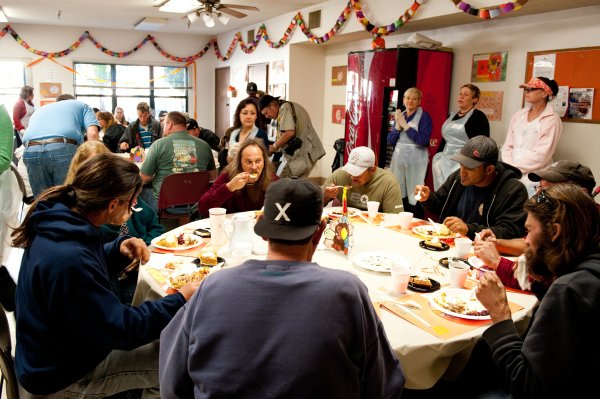Working by Night
Homeless by Day

Financially speaking, being homeless has some hidden costs. First and foremost, by not having a refrigerator or cupboard, all food must be prepared and ready to eat immediately. Since food in a restaurant has a 300 percent mark-up, the free lunch at the Salvation Army is the best bet for one meal per day except Sunday. There is a hot lunch served at the Casa Esperanza, but it requires waiting in line and if you have a busy schedule, like I do, you cannot trek across town to eat. So a free lunch in a bag is my daily bread.
I am accidentally able to save much money simply by having my expenditures slashed. Every paycheck that comes in goes into the bank with little or no overhead. Most of the other homeless people get money through government aid and Social Security. Some have day jobs where they make a small amount of cash they are able to save. During my time on the street I have seen one man leave the Rescue Mission to a transitional home only to be plagued by court costs, hindering his ability to pay for education that will get him a secure decent job that pays more than the one he already has.
Since my work begins in the evening, I spent one day out in my uniform finding productive outlets for time, such as writing this article. The next day I was going about the exact same tasks, and got a concerned look from a passerby. Then a child veered out of my path, and a man on a park bench stared at me with the same exact look as when a customer wrongly thinks you gave incorrect change.
Frightened that I might have left my zipper open I looked down. Then I realized I was wearing a large bulky coat, and with my backpack that made me obviously homeless. Really, Santa Barbara? I looked up at the fat ugly man on the bench, who was still staring. I go the gym and work out every day, and I would rather be homeless with a gym membership than have a house and diabetes. I smiled. Judge me all you want, stare angrily at this drug-free employed man who saves 90 percent of his paycheck, it’s not affecting me one bit.
One reason that people do not like homeless is that they allegedly lack social skills and contribute no value to the community. Yet a week ago, I had to help a woman in an electric chair, and a man pushing the chair, which had lost power, to get it uphill into the nearest store that had an outlet, which was a coffee shop. A middle-aged gentleman coolly watched us, sipping from his latte and not making any attempt to get up or hold the door open for two people pushing a woman in a wheelchair. We rolled in, and I asked her how long it took to charge her chair and reassured her she was just fine and we were there to help. When I plugged her chair into the wall, the man finally stepped up to the plate. “Are you sure the owner would be okay with that?” I’m too polite to just ignore people, and I was not able to comprehend where this sociopath was coming from, so I just announced I’d e-mail the owner. In a huff he got up and left. Whoops, my fault.
There are a few doctors who make an avocation of caring for the street-dwellers; concerned citizens like these are the majority and not the blaring minority bad examples cited above. The problems that keep homeless people on the street seem to stem from alcoholism, substance abuse, and social apathy. Some of these people are trapped in their own worlds, spending all day mumbling quietly about the dreams they have, and others hit the bottle, the pipe, or the bench to jabber-jaw all day. They get their check from the government, sit down all day looking for handouts from passersby, talking, arguing, and then at they end of the day have accomplished nothing. In effect, they generally behave just like Congress.
Most of these people have disabilities, or are socially inept. Some are so far gone, mentally, that only intense therapy may yield acceptable results. The one thing they can do is work. There has to be some kind of work they can do to besides spainging (a portmanteau of “spare change,” used to describe what I’d call begging). Seriously, if I had to choose between a crackhead getting money and a crackhead with a broom sweeping the front step of a store getting money, I’d take the latter. There has to be a resource to give people something to do besides start fights or do nothing seven days a week.



